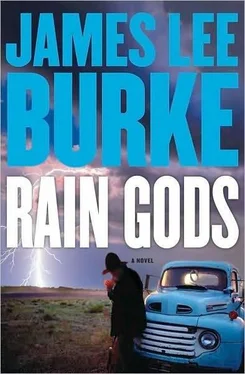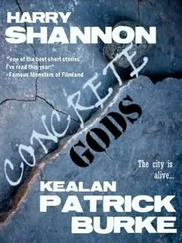He pointed his revolver in front of him and walked around the tables and at an angle to the bar, closer and closer to the corner of the room where the erratic knocking sound continued. Now he could see the holes in the vinyl padding of the booths and the divots blown out of the wood trim and more holes stitched across the walls. He could see the glass beer steins and long-necked bottles exploded on top of the tables. He could see the men who had either been caught unawares in the first burst, or those who had been herded up against a wall and mowed down, probably disbelieving and terrified and trying to bargain all the way to the end.
“Sweet God in heaven,” Pam said behind him. Her weapon was still pointed with both hands in front of her. She looked to her right and left, then turned in a full circle before putting her pistol back in its holster. “Who are these guys?”
“I don’t know. Call it in. Tell the dispatcher to send all the medical personnel they can.”
Three men had died in a booth. The backs of their heads had burst all over the pine paneling on the wall. Two other men lay behind a poker table. Their chips were still stacked in columns, their five-card-stud hands laid out faceup on the felt. The exit wounds in their backs had streaked the wall five feet from the floor down to where they had fallen.
“What’s that knocking sound?” Pam asked.
Hackberry walked to the end of the bar. A man lay on his back in the shadows. There was one hole high up on his thigh, one in his stomach, and one in his neck. His eyes were closed, and his lips were compressed tightly in a cone, as though he were sucking on a piece of candy or trying to deal with a terrible sliver of pain working its way through his viscera. A pool of blood was spreading out from his sides into the wood floor. His face was round and white, in stark contrast to his black hillbilly sideburns and eyes that glinted like obsidian, buried deep inside the folds of his flesh.
He wore pointed ostrich boots, and his left foot was striking the side of the bar spasmodically. Hackberry holstered his revolver and knelt beside him. “Who did this to you, partner?” he said.
The inside of the man’s mouth was red with blood, his voice hardly more than a whisper. “Collins. Preacher Collins. Him and Bobby Lee.”
“Bobby Lee Motree?”
The man closed and opened his eyes by way of an answer. He said, “Yes, sir.”
“What’s your name?”
“T-Bone Simmons.”
“Why did Collins shoot you?”
“He picked up two hundred grand from Hugo. But he wanted Hugo, too.”
Hackberry looked back at where the other bodies lay. “Hugo Cistranos?” he said.
“Yes, sir.”
“Collins kidnapped Cistranos?”
T-Bone choked on his own blood and saliva and didn’t try to answer.
Pam handed Hackberry a towel she had found behind the bar. Hackberry began to work the towel behind T-Bone’s head. “I’m going to turn your head to the side to drain your mouth. Just hang on. An ambulance is on its way. Where did Preacher and Bobby Lee go?”
“Don’t know. They had a-”
“Take your time, bud.”
“A woman in their car.”
“A woman was with Preacher and Bobby Lee?”
“The Jew’s wife. We were supposed to pop her. She was supposed to get it in the mouth.”
“You’re talking about Nick Dolan’s wife?”
T-Bone didn’t answer. A metallic odor rose from his mouth.
“You’re losing a lot of blood,” Hackberry said. “I’m going to roll you on your side, and we’re going to plug up that hole in your back. You with me on this?”
“My spine is cut. I don’t feel anything down there.”
“Where did Preacher take Cistranos and Mrs. Dolan?”
“I hope to hell.”
“Come on, bub. Don’t let Preacher and Bobby Lee get away with this. Where would they go?”
“Preacher can do things nobody else can do.”
It was pointless. A strange transformation had begun to take place in T-Bone’s eyes, one Hackberry had seen in battalion aid stations and triage situations and in a subfreezing POW shack where men with ice crystals in their beards and death in their throats stared intently at everything around them, as though taking the measure of the world, when in reality they saw nothing, or at least nothing they ever told the world about.
“My roast,” T-Bone said.
“Say again?”
“My pot roast is burning. It’s addax. It cost five grand to kill it.”
“Don’t worry about it. We’ll handle it,” Hackberry said, looking up at Pam Tibbs.
“I’m a good cook. Always was,” T-Bone said. Then he closed his eyes and died.
Pam Tibbs walked away, her hands on her hips. She stood still, looking at the floor, her back turned to Hackberry.
“What is it?” he said.
“I saw a security camera mounted on the corner of the building. The lens is pointed at the parking lot,” she said.
He glanced at the TV mounted above the bar. Below it was a VCR. “See if it has a tape.”
BOBBY LEE MOTREE placed his hand on Hugo Cistranos’s shoulder and walked with him to the cliff’s edge, like two friends enjoying a panoramic view of topography that seemed as old as the first day of creation. Down below, Hugo Cistranos could see the tops of cottonwood trees along a streambed that had gone dry in late summer and whose banks were flanged with automobile scrap jutting from the soil like pieces of rusted razor blades. Farther out from the cliff was a cluster of trees that still had flowers in the branches. Beyond the streambed and the trees was a long flat plain where the wind was troweling thick curds of yellow dust into the air. The vista that lay before Hugo Cistranos’s eyes was like none he had ever seen, as though this place and the events transpiring in it had been invented for this moment only, unfairly, without his consent as a participant. He hawked and spat downwind, leaning away from Bobby Lee, anxious to show his deference and care. “I was just delivering the money,” he said.
“You bet, Hugo. We’re glad you did that, too,” Bobby Lee replied.
The plateau was limestone, topped with a soft carpet of soil and grass that was surprisingly green. The wind was cool, flecked with rain, and smelled of damp leaves and perhaps the beginning of a new season. Twenty yards away, Preacher Collins was talking in Spanish to two Mexican killers who had a great gift for listening while he spoke, absorbing every word, never challenging or advising, their taciturnity an affirmation of his will.
Their pickup truck was parked next to Preacher’s Honda, the compact’s back window pocked with a hole that looked like a crystalline eye. The Jewish woman sat in the backseat, her expression less one of anger than of thought, her purse and a box of brownies next to her. What did Preacher intend to do with her? Not harm her, certainly. And if Preacher wasn’t going to harm her, maybe he would not harm Hugo, at least not in her presence, Hugo told himself.
“Beautiful, isn’t it?” Bobby Lee said. “Puts me in mind of the Shenandoah Valley, without the greenery and all.”
“Yeah, I know what you mean,” Hugo said. He lowered his voice. “Bobby Lee, I’m a soldier just like you. I take orders I don’t like sometimes. We’ve been on a lot of gigs together. You hearing me on this, son?”
Bobby Lee squeezed Hugo’s shoulder reassuringly. “Look yonder. See the deer running inside the wind. They’re playing. They know fall is in the air. You can smell it. It’s like wet leaves. I love it when it’s like this.”
As Hugo looked into Bobby Lee’s face, he knew for the first time in his life the distinction between those who had a firm grasp on the day and the expectation of the morrow and those who did not.
Читать дальше












